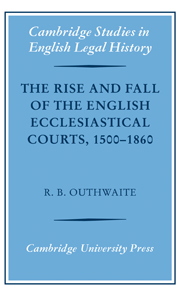Book contents
- Frontmatter
- Contents
- Foreword by R. H. Helmholz
- Preface
- Table of parliamentary statutes
- List of abbreviations
- 1 The ecclesiastical courts: structures and procedures
- 2 The business of the courts, 1500–1640
- 3 Tithe causes
- 4 Wills and testamentary causes
- 5 Defamation suits
- 6 Marital suits and marriage licences
- 7 Office causes
- 8 The roots of expansion and critical voices
- 9 Charting decline, 1640–1830
- 10 Explaining decline
- 11 The bills of 1733–1734
- 12 Snips and repairs: small steps to reform, 1753–1813
- 13 Royal commissions and early fruits, 1815–1832
- 14 Reform frustrated
- 15 Reforms thick and fast, 1854–1860
- Select bibliography
- Index
Foreword by R. H. Helmholz
Published online by Cambridge University Press: 21 January 2010
- Frontmatter
- Contents
- Foreword by R. H. Helmholz
- Preface
- Table of parliamentary statutes
- List of abbreviations
- 1 The ecclesiastical courts: structures and procedures
- 2 The business of the courts, 1500–1640
- 3 Tithe causes
- 4 Wills and testamentary causes
- 5 Defamation suits
- 6 Marital suits and marriage licences
- 7 Office causes
- 8 The roots of expansion and critical voices
- 9 Charting decline, 1640–1830
- 10 Explaining decline
- 11 The bills of 1733–1734
- 12 Snips and repairs: small steps to reform, 1753–1813
- 13 Royal commissions and early fruits, 1815–1832
- 14 Reform frustrated
- 15 Reforms thick and fast, 1854–1860
- Select bibliography
- Index
Summary
This account of the jurisdiction of the English ecclesiastical courts was the last work written by R. B. Outhwaite before his early death from cancer in the spring of 2005. It completed one part of his scholarly career. The book also fills a gap in knowledge. Many treatises on the law of the Church of England contain a historical dimension and general treatments of English law sometimes have a little to say about the ecclesiastical courts. But most of these works approach the subject from the outside, using evidence from the common law to describe what happened in the spiritual forum. That is necessarily second-hand evidence. And despite some forays into the history of the courts of the church after their restoration in the 1660s, such as the two excellent books written by Professor Stephen Waddams of the University of Toronto, there has been no overall account of the history of ecclesiastical jurisdiction itself. Little has been written from the perspective of the general historian, that is, the historian who seeks to trace the fate of the courts as they found their way forwards after the Elizabethan Settlement and then, later on, as they approached the demise of their jurisdiction over the laity in the mid-nineteenth century. Brian was that historian, and this is the gap his work fills.
- Type
- Chapter
- Information
- Publisher: Cambridge University PressPrint publication year: 2007
- 3
- Cited by



